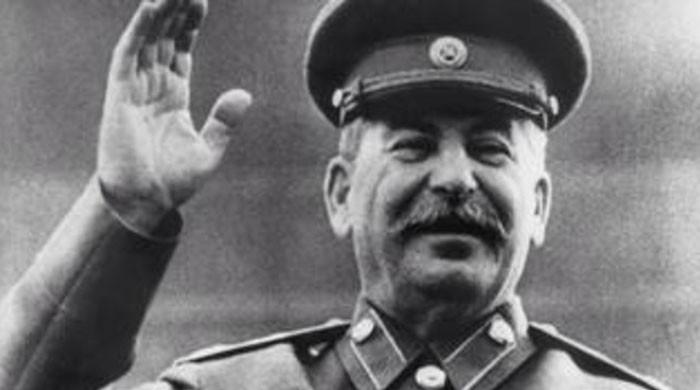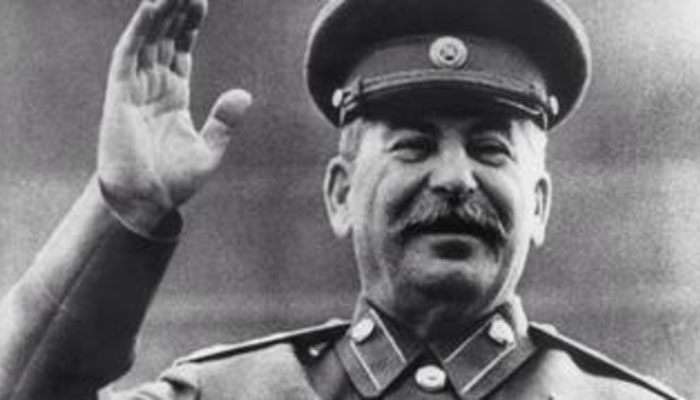

A group of Soviet mechanics slog through a muddy forest on a mission that would eventually help change the course of World War II: reaching dictator Joseph Stalin.
Among them is an engineer who wants to convince the Kremlin leader that a new tank he has designed can transform the Soviet Union's outdated forces a year ahead of the invasion by Nazi Germany.
Based on a little-known chapter of Soviet history from 1940 - this is the scenario for a new film being shot outside Moscow with state funding.
The movie - currently with the working title "To See Stalin" - is the latest in a string of government-backed productions about inspiring tales from World War II aimed at bolstering patriotic fervour that the Kremlin can then tap.
But critics argue that they tend to whitewash the crimes of the Soviet leadership while downplaying the tragedies of the war -- and also play fast and loose with the truth.
"The idea came from the culture ministry, which has been actively pushing to retell the stories of the heroes from our country's past," 32-year-old director Kim Druzhinin told AFP as he oversaw the shoot.
'Stalin is the culmination'
Druzhinin's latest project centers on the epic tale of Mikhail Koshkin, who in the spring of 1940 drove his prototype tank more than 2,000 kilometres (1,250 miles) across the Soviet Union to pitch the design to Stalin.
The journey would eventually cost Koshkin his life, as he died from pneumonia contracted along the route.
But his legendary T-34 tank went into mass production and eventually helped Moscow push back Nazi forces after their devastating invasion of the USSR in 1941.
"It is tragic story about a designer who got his tank into production at the cost of his own life," said Druzhinin.
The film - which the director says he wants to shoot "in the style of a Soviet adventure movie" - has raised some eyebrows over what is expected to be a positive portrayal of supremo Stalin in a fleeting appearance at the end of the film.
Under the conservative rule of President Vladimir Putin Russian authorities have sought to downplay the horrors of Stalin's rule during which millions were executed or sent to labor camps.
Instead, officials highlight his role in winning the war against Germany, maintaining the conflict that claimed an estimated 22 million Soviet lives more than 70 years ago as a sacrosanct rallying point for society today.
"Stalin is the culmination of the film, the destination, the reward you must receive like at the end of a fairytale," Druzhinin said.
Propaganda myth
The film received the bulk of its financing - 60 million rubles ($1 million, 860,000 euros) - from the Russian culture ministry.
Those involved in the production have no doubt over its aim.
"When I read the script and saw that it was ordered by the culture ministry I immediately understood that it was aimed at stirring up patriotism," said actor Dmitry Podnozov, who plays one of Koshkin's crew.
The authorities have "fear of young people taking to the streets to protest", Podnozov said, so are looking to generate nationalist pride to curb any anti-Kremlin sentiment.
For director Druzhinin this is not a first foray into making controversial state-sponsored films on sticky historical subjects.
Last year his WWII action movie called "Panfilov's 28" came out about the legendary resistance of a group of Soviet soldiers who sacrificed their lives destroying 18 German tanks advancing on Moscow in 1941.
Despite a poor response from the critics, the film drew support from the highest levels of the Kremlin - with Putin sitting down to watch it alongside President Nursultan Nazarbayev of Kazakhstan.
But, while the tale of heroism had served to inspire generations of Soviet and Russian citizens, there was one major catch. It appears not to have been true.
Documents declassified by Russia's state archive in 2015 showed that the famed incident was in fact invented by a Soviet journalist before becoming part of the Soviet war propaganda.
The revelations sparked a scandal and pitched the head of the archive Sergei Mironenko into a conflict with culture minister Vladimir Medinsky. Mironenko later left his post.
And when Druzhinin's version of the story hit the big screen, Medinsky lashed out against those who questioned its worth.
"My most profound conviction is that even if this story was invented from the beginning, even if Pamfilov's troops did not exist, even if nothing happened - this is a sacred legend that cannot be touched," Medinsky told Russian news wire Interfax.
"People who do this are of course scum."
No comments:
Post a Comment